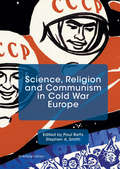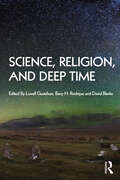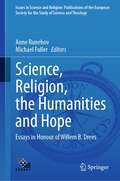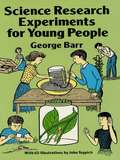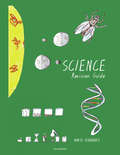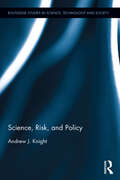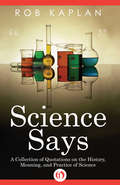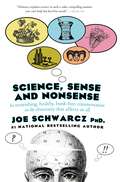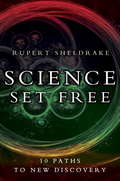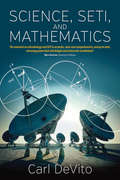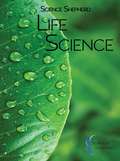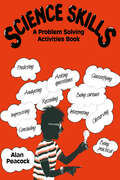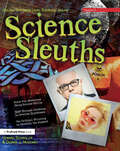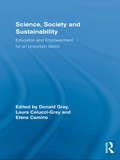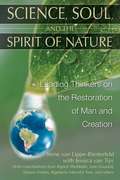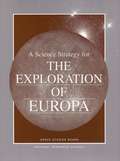- Table View
- List View
Science, Religion and Communism in Cold War Europe
by Paul Betts Stephen A. SmithReligion and science were fundamental aspects of Eastern European communist political culture from the very beginning, and remained in uneasy tension across the region over the decades. While both topics have long attracted a great deal of scholarly attention, they almost invariably have been studied discretely as separate stories. Religion, Science and Communism in Cold War Europe is the first scholarly effort to explore the delicate interface of religion, science and communism in Cold War Europe. It brings together an international team of researchers who address this relationship from a number of national viewpoints and thematic perspectives, ranging from mysticism to social science, space exploration to the socialist lifecycle, and architectural heritage to pop culture.
Science, Religion and Deep Time
by Lowell Gustafson Barry H. Rodrigue David BlanksThis book examines the meaning of religion within the scientific, evidence-based history of our known past since the big bang. While our current major religions are only centuries or millennia old, our volume discusses the origins and development of human religious practice and belief over our species’ existence of 300,000 years. The volume also connects the scientific approach to natural and social history with ancient truths of our religious ancestors using new lines of inquiry, new technologies, new modes of expression, and new concepts. It brings together insights of natural scientists, social scientists, philosophers, writers, and theologians to discuss narratives of the universe. The essays discuss that to apprehend religion scientifically, or to interpret and explain science theologically, the subject must be examined through a variety of disciplinary lenses simultaneously and raise several theoretical, philosophical, and moral problems. With a singular investigation into the meaning of religion in the context of the 13.8 billion-year history of our universe, this book will be indispensable for scholars and students of religious studies, big history, sociology and social anthropology, philosophy, and science and technology studies.
Science, Religion, the Humanities and Hope: Essays in Honour of Willem B. Drees (Issues in Science and Religion: Publications of the European Society for the Study of Science and Theology #8)
by Anne Runehov Michael FullerThis book collects a multidisciplinary range of contributions focusing on the prolific and seminal work of Willem Drees in the fields of philosophy of religion, philosophy of the humanities, and science and theology/religion. Trained in both theoretical physics and theology/philosophy of religion, Drees holds doctoral degrees in both theology and in philosophy and, amongst other distinguished positions, held professorships at the University of Leiden and at the University of Tilburg. Drees was also Editor-in-Chief of Zygon, Journal of Religion & Science, between 2008 and 2018, and served as President of the European Society for the Study of Science and Theology (ESSSAT) between 2002 and 2008. In 2018, he was elected as member of the Royal Holland Society of Sciences and Humanities (KHMW). This contributed volume builds on Drees’ expansive and provocative scholarly contributions, notably around the concept and meaning of naturalism and the humanities to the fields of science and religion, as exemplified by his works Religion, Science and Naturalism (1996) and What Are the Humanities For? (2021). In a time where more and more young people across the globe are entering higher education such cross-disciplinary explorations and (re-)evaluations are vital to the field. Accordingly, by approaching his work from a variety of disciplines this collection illuminates the broad reach of Drees’ work and provides scholars from various fields with many new and rich opportunities avenues for research.
Science Reporter Oct- 2018
by CsirThis a magazine which is published every month of the year for science update.
Science Research Experiments for Young People
by George BarrIntriguing, abundantly illustrated collection of 40 experiments to attract and stimulate young minds. Subjects range from electricity and magnetism to weather, water, distance and time. Among the projects: flight testing homemade rocket balloons and tracking electricity around the house.
Science Resources (Grade #4)
by Lawrence Hall of Science Team at the University of CaliforniaHandbook for fourth graders to understand and appreciate the fundamentals of science grouped into 3 modules - Magnetism and Electricity, Environment and Solid Earth.
Science Revision Guide
by Marta FernándezKs3 Science Revision Guide Pequeño libro de Ciencias para estudiantes de los primeros cursos de secundaria del sistema británico. Aprende ciencias a la vez que aprendes inglés. Se trata de un material didáctico y artesanal, lleno de inspiración y de ganas de aprender.
Science, Risk, and Policy (Routledge Studies in Science, Technology and Society #32)
by Andrew J. KnightFor decades, experts and the public have been at odds over the nature and magnitude of risks and how they should be mitigated through policy. Experts argue that the fears of the public are irrational, and that public policy should be based on sound science. The public, on the other hand, is skeptical of experts, and believe policy should represent their interests. How do policy analysts make sense of these competing views? Science, Risk and Policy answers this question by examining how people evaluate evidence, how science is conducted, and how a multi-disciplinary framework to risk can inform policy by bridging the gap between experts and the public. This framework is then applied to four case studies: pesticides, genetically engineered foods, climate change, and nuclear power. By tracing the history of the science, policies and regulations, and evaluating arguments made about these risks, Andrew J. Knight provides a guide to understand how experts and the public view risks.
Science Saurus: A Student Handbook
by Houghton Mifflin Harcourt Publishing CompanySciencesaurus is a science resource book for grades 6 - 8.
Science Says
by Rob KaplanPerhaps no other topic is as relevant to our lives today as science. We look to the interpreters of science for wisdom and answers, insights into the nature of the universe and who we are, as well as explanations for the common and everyday world in which we live. Here, then, is an indispensable collection of the best that has been written and said about science from ancient times to today. Written by scientists and philosophers alike, the passages in this handy volume are filled with wit and wisdom, and range from brief insights to longer, thought-provoking quotes.
Science, Sense and Nonsense: 61 Nourishing, Healthy, Bunk-free Commentaries on the Chemistry That Affects Us All
by Joe SchwarczWhen did "chemical" become a dirty word?Forty or so years ago, chemistry -- which had been recognized as a miracle-making boon to humanity - somehow became associated with warfare, sinister food additives, "toxins" and pollution.It's a situation that Dr. Joe Schwarcz aims to put into perspective. Yes, there's a downside to chemistry, he says, but this is dwarfed by its enormous benefits.Dr. Joe's new collection of commentaries will inspire an appreciation for the science of everyday life, and equip you to spot the muddled thinking, misunderstandings and deceptions in media stories and advertising claims. Does organic food really always equal better food? Are vaccines dangerous? Will the latest health fad make you ill? Do expensive wrinkle creams do the job? What are the best ways to avoid cancer? The answers to such questions often lie in anunderstanding of the chemistry involved. Ask Dr. Joe.Science, Sense and Nonsense celebrates chemistry's great achievements, lambastes its charlatans, and explores its essential connections to our wellbeing. And does so in authoritative, highly readable, good humoured style.From the Trade Paperback edition.
Science Set Free: 10 Paths to New Discovery
by Rupert SheldrakeThe bestselling author ofDogs That Know When Their Owners Are Coming Homeoffers an intriguing new assessment of modern day science that will radically change the way we view what is possible. In Science Set Free, Dr. Rupert Sheldrake, one of the world's most innovative scientists, shows the ways in which science is being constricted by assumptions that have, over the years, hardened into dogmas. Such dogmas are not only limiting, but dangerous for the future of humanity. According to these principles, all of reality is material or physical; the world is a machine, made up of inanimate matter; nature is purposeless; consciousness is nothing but the physical activity of the brain; free will is an illusion; God exists only as an idea in human minds, imprisoned within our skulls. But should science be a belief-system, or a method of enquiry? Sheldrake shows that the materialist ideology is moribund; under its sway, increasingly expensive research is reaping diminishing returns while societies around the world are paying the price. In the skeptical spirit of true science, Sheldrake turns the ten fundamental dogmas of materialism into exciting questions, and shows how all of them open up startling new possibilities for discovery. Science Set Free will radically change your view of what is real and what is possible.
Science, Seti, and Mathematics
by Carl L. DeVitoMathematics is as much a part of our humanity as music and art. And it is our mathematics that might be understandable, even familiar, to a distant race and might provide the basis for mutual communication. This book discusses, in a conversational way, the role of mathematics in the search for extraterrestrial intelligence. The author explores the science behind that search, its history, and the many questions associated with it, including those regarding the nature of language and the philosophical/psychological motivation behind this search.
Science Shepherd Biology
by Scott Hardin MdThe first edition has been pretty well received by reviewers and, more importantly, parents and students. It is gratifying to receive thanks and compliments, which really serve as great blessings to me. I am also very grateful to the many parents and students who have asked questions and made suggestions regarding what they might like to see either in the next edition or in an entirely new subject. Over the past couple of years, I had become increasingly convicted by the Holy Spirit that my first edition treatment of creation and evolution was not what it should be, that God wanted more. In the first edition, the presentation was much softer as related to the correlation of biblical principles to scientific interpretation. One affects the other and I really felt that God was telling me that I needed to incorporate more theologically based and exegetically sounder creation and evolution chapters into the biology curriculum.
Science Shepherd Life Science Textbook (2012 Edition)
by Scott HardinScience Shepherd's Life Science curriculum was developed for homeschoolers who wish to teach science through the middle school levels--without any fear! Designed for independent students, the step-by-step fashion makes it easy for students to progress without extensive parental knowledge. Full-color photos and graphics are included with descriptive labels; study questions are given at the end of each chapter. This textbook covers the characteristics of life, cells, DNA, heredity, and the classification structure of each kingdom. Evolution and creation are also covered from a creationist perspective.
Science Skills: A Problem Solving Activities Book
by Alan PeacockThis is a practical book for pupils, designed to teach the basic skills of scientific investigation and problem solving. With an emphasis on skills not facts, it is practical in approach, describing over 100 activities. No specialised apparatus is required and the investigations it covers are flexible enought to relate to any science course.
Science Sleuths: Solving Mysteries Using Scientific Inquiry (Grades 6-9)
by Howard Schindler Dennis J. MucenskiBuilding on the growing public interest in forensics, the three cases featured in Science Sleuths: Solving Mysteries Using Scientific Inquiry merge science and literacy, requiring students to be critical and active readers as they conduct their investigation. Beginning with an evaluation of the crime scene photos, the student investigators will analyze lab reports, phone messages, and interviews to extract key information. Students will sort through the evidence to formulate their initial hypothesis (being alert to red herrings) as they work to identify the person responsible for each crime. Students are given additional sets of information as they make their way through the case, requiring them to reformulate their initial hypothesis until they arrive at a final conclusion. The students' final write-up consists of a chart explaining the means, motive, and opportunity for each of the suspects, in addition to a thorough analysis of the evidence and a recreation of the case. Eventually, students are able to determine which suspect should be charged with the crime!Students will:solve fun mysteries using science skills,sort through evidence to develope hypotheses, anduse critical thinking to identify the suspect.Grades 6-9
Science, Social Science class 6 - Tamil Nadu Board
by Tamil GovernmentThe Science textbook for standard six has been prepared following the guidelines given in the National Curriculum Framework 2005. The book is designed to maintain the paradigm shift from the primary General Science to branches as Physics, Chemistry, Botany and Zoology.
Science, Social Science Volume 3 Term 2 class 6 - Tamil Nadu Board
by Tamil GovernmentThe Science textbook for standard six has been prepared following the guidelines given in the National Curriculum Framework 2005. The book is designed to maintain the paradigm shift from the primary General Science to branches as Physics, Chemistry, Botany and Zoology.
Science, Social Science Volume 3 Term 3 class 6 - Tamil Nadu Board
by State Council of Educational Research TrainingThe Social Science textbook for standard six of term 3 and volume 3. The book is designed to maintain the paradigm shift from the primary General Science to branches as Physics, Chemistry, Botany and Zoology.
Science, Society and Sustainability: Education and Empowerment for an Uncertain World (Routledge Research in Education)
by Donald Gray Laura Colucci-Gray Elena CaminoRecent work in science and technological studies has provided a clearer understanding of the way in which science functions in society and the interconnectedness among different strands of science, policy, economy and environment. It is well acknowledged that a different way of thinking is required in order to address problems facing the global community, particularly in relation to issues of risk and uncertainty, which affect humanity as a whole. However, approaches to education in science tend to perpetuate an outmoded way of thinking that is incommensurable with preparing individuals for participation and decision-making in an uncertain, complex world. Drawing on experiences of interdisciplinary dialogue and practice in a higher education context, this book illustrates how reformulating the agenda in science and technology can have a revolutionary impact on learning and teaching in the classroom at all levels. This exceptional study will interest scholars in Education, Science, Technology, and Society, and those looking to further deliberative democracy and civic participation in their students.
Science, Soul, and the Spirit of Nature: Leading Thinkers on the Restoration of Man and Creation
by Irene van Lippe-Biesterfeld Jane Goodall Jessica Van Tijn Masaru Emoto Rigoberta Menchú Tum Rupert SheldrakeAn exploration of the relationship between humans and nature through conversations with 12 leading scientific and social visionaries • Explores the importance of the unification of humankind and nature as it relates to creation, destruction, diversity, and the spiritual health of the world • Contains interviews with Rupert Sheldrake, Jane Goodall, and Nobel Peace Prize-winner Rigoberta Menchú Tum, among others Society’s attitude toward nature has changed considerably over the years. Terms pertaining to the anthropocentric paradigm of "mankind in charge," such as supervisor or owner, have been replaced by caretaker or trustee. This approach, although more appropriate, still indicates a complete separation of humankind from nature. Yet increasing numbers of people have begun to feel that they are intrinsically part of nature. This concept of unity with the natural world--that we are nature--is gaining momentum among many innovative social reformers from many diverse fields. In Science, Soul, and the Spirit of Nature, Irene van Lippe-Biesterfeld interviews 12 respected visionary thinkers, representing all continents, about their deep connection with the earth and their views on the relationship between humanity and nature. Presented as a series of thought-provoking conversations, this book delves deeply into the many conceptions we hold about nature, showing that while many strides have been made in the area of its preservation, we must now take the next step. Each contributor adds insights into the urgent change in consciousness that we must adopt in order to heal and restore our holistic relationship with the earth that was emblematic of the first peoples--reminding us that a separation from and destruction of nature is a spiritual destruction of ourselves.
Science Squad: Porpoises In Peril
by Gwendolyn HooksCan Jada, Kate, Cam, and Reggie use their scientific and observation skills to find out what..or who... is making the porpoises unwell?
A Science Strategy for the Exploration of Europa
by National Research CouncilA Science Strategy for the Exploration of Europa
